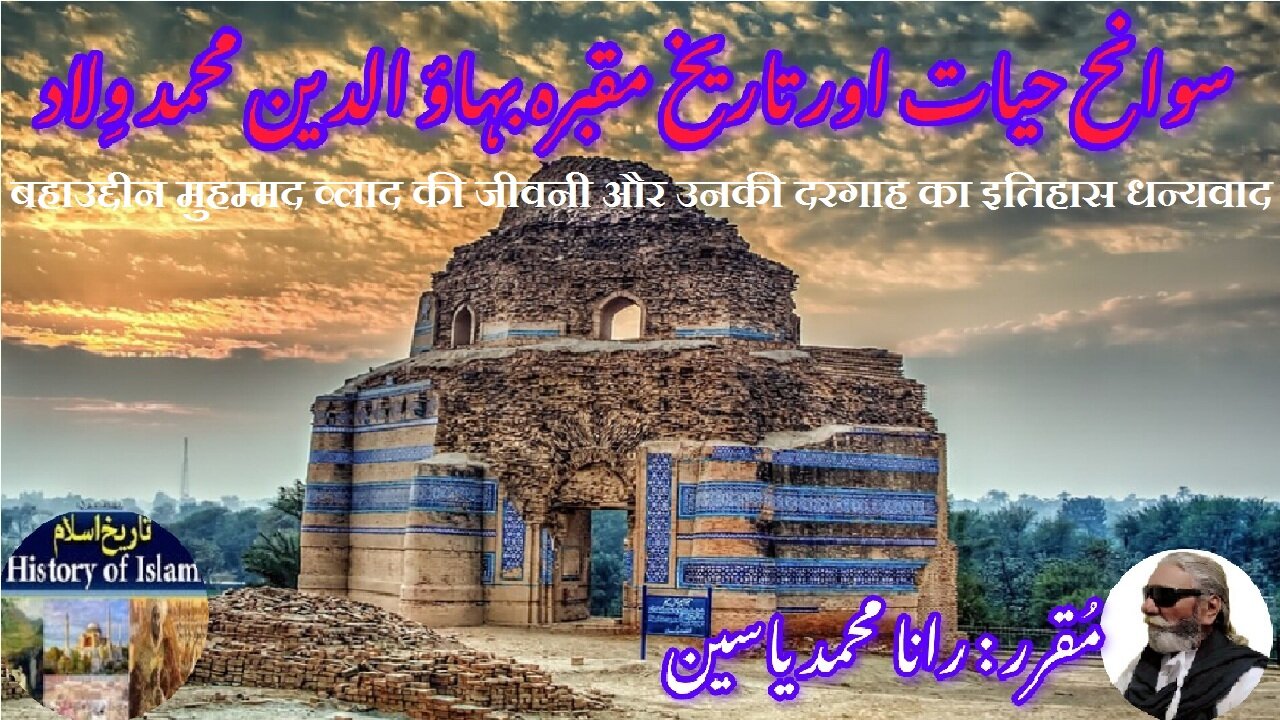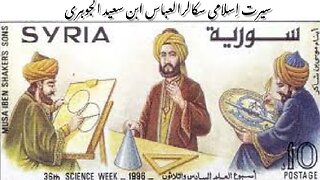Premium Only Content

Bahauddin Muhammad Vlad & his shiren بہاء الدین محمد ولاد کی سوانح حیات اور ان کے مزار کی تاریخ
@islamichistory813 #sufisaint #cultural #heritage #biography #islamic #mysticism #islamic #philosophy #shrine #historical #figures
Biography of Baha al-Din Muhammad-i Walad and the history of his shrine
Dekhti Aankhooon aur sountay kaanoon ko Asslamoalaikum, sisters, brothers friends and elders, in informative series videos of Islamic ascolars, sufisaints, cultural heritages, islamic philosophys, islamic mysticisms and historical figures. today we are describing biography of Baha al-Din Muhammad-i Walad and the history of his shrine.
Baha al-Din Muhammad-i Walad, more popularly known as Sultan Walad, was a prominent 13th-century Sufi scholar, poet, and spiritual leader. Born in 1226 in Laranda (present-day Karaman, Turkey), he was the eldest son of the renowned Persian poet and mystic Jalal al-Din Rumi and his wife Gawhar Khatun, the daughter of Lala Sharaf al-Din of Samarkand. Sultan Walad played a pivotal role in the establishment and development of the Mevlevi Order (Mawlawiyya), which became one of the most influential Sufi orders in the Islamic world.
From an early age, Sultan Walad was immersed in an environment rich in spiritual and intellectual pursuits. His father, Rumi, recognized his son's potential and sent him, along with his brother Ala al-Din Muhammad, to Aleppo and Damascus to pursue advanced studies in Islamic sciences. During his time in Damascus, Sultan Walad was tasked by Rumi to locate and invite back the elusive mystic Shams Tabrizi, whose companionship had profoundly influenced Rumi's spiritual journey. Sultan Walad's successful mission to bring Shams back to Konya further solidified his role as a devoted disciple and facilitator of his father's spiritual circle.
Sultan Walad's personal life was intertwined with his spiritual commitments. He married Fatima Khatun, the daughter of Salah al-Din Zarkub, a close associate of Rumi. Together, they had two daughters, Mutahhara Khatun and Sharaf Khatun, both of whom were known for their piety and spiritual insight, and a son, Jalal al-Din Arif. Sultan Walad also had other children from his marriages to Nusrat Khatun and Sunbula Khatun, including sons who continued the family's spiritual legacy.
Following Rumi's death in 1273, the leadership of his spiritual community initially passed to Husam al-Din Chalabi. After Husam al-Din's demise, Sultan Walad was urged by the disciples to assume the role of spiritual guide. He accepted this responsibility and dedicated himself to organizing and formalizing the teachings of his father, leading to the establishment of the Mevlevi Order. Under his guidance, the order emphasized the practice of the Sama (whirling dance) and the recitation of Rumi's poetry as means of spiritual elevation.
Sultan Walad was also a prolific writer and poet. He composed works in Persian, Arabic, Turkish, and Greek, reflecting the multicultural milieu of Anatolia during his time. His notable works include the "Waladnama" (also known as "Ibtidanama"), "Rababnama," "Intihanama," and "Ma'arif." These writings not only preserved and disseminated Rumi's teachings but also contributed to the broader corpus of Sufi literature. His poetry, while deeply influenced by his father's style, carried its own unique insights and expressions of spiritual longing.
Sultan Walad passed away on 12 November 1312 in Konya, where he was laid to rest beside his father in the mausoleum that had become a center for the Mevlevi Order. The mausoleum, originally a rose garden gifted by the Seljuk Sultan to Rumi's father, Baha al-Din Walad, evolved into a complex housing a mosque, ritual hall, dervish cells, and other facilities. Over time, it became a pilgrimage site for devotees and a symbol of the enduring legacy of Rumi and Sultan Walad. The site, known today as the Mevlana Museum, continues to attract visitors from around the world, drawn by the spiritual heritage preserved within its walls.
Sultan Walad's contributions to the spiritual and cultural life of the Islamic world are profound. Through his leadership, writings, and organizational skills, he ensured that the teachings of his father would not only survive but flourish, influencing countless generations. His efforts in establishing the Mevlevi Order provided a structured path for seekers of divine love and knowledge, making him a central figure in the history of Sufism.
With this, we seek your permission until tomorrow, tomorrow we will describe the biography of Shah Mohammed Farid-ud-Din Baghdadi and the history of his Shrine.
Allah Hafiz
==============================
-
 7:53
7:53
ISLAMIC HISTORY
23 hours agoBiography of Al-Abbas ibn Said al-Jawhari سیرت العباس بن سعید الجوہری
8 -
 1:00:41
1:00:41
VINCE
2 hours agoThe Schumer Shutdown Shafts Americans Again | Episode 138 - 10/02/25
123K57 -
 30:17
30:17
Simply Bitcoin
2 hours agoBitcoin Crucible Episode 2 w/ Alex Stanczyk
947 -
 1:33:20
1:33:20
Dear America
3 hours agoGUEST: ERIC TRUMP! Dems ADMIT to Shutdown! + Feds Move to Tennessee!!
106K31 -
 2:24:37
2:24:37
Matt Kohrs
12 hours agoROCKETING TO NEW HIGHS 🚀🚀🚀 (Stock Market Open) || Live Trading Futures & Options
37K3 -
 LIVE
LIVE
Wendy Bell Radio
6 hours agoDemocrats Are Getting CLOBBERED
7,218 watching -
 LIVE
LIVE
LFA TV
6 hours agoLIVE & BREAKING NEWS! | THURSDAY 10/2/25
4,362 watching -

Chad Prather
15 hours agoWhen God Delays: Trusting Jesus in the Waiting Room of Life
50.4K6 -
 2:00:39
2:00:39
The Chris Salcedo Show
15 hours ago $10.20 earnedThe Democrat's Schumer Shutdown
49.9K5 -
 30:32
30:32
Game On!
19 hours ago $4.05 earned20,000 Rumble Followers! Thursday Night Football 49ers vs Rams Preview!
50.3K4